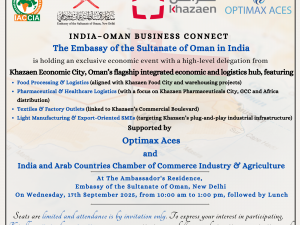As anticipation builds for the 2nd India Cargo Terminal Expo & Conference 2025, the logistics and air cargo industry are set to converge once again for one of the most focused events in the sector. Scheduled to be held from 28 to 30 August 2025 at Yashobhoomi Convention Centre, Dwarka, New Delhi, the event aims to bring together key stakeholders from air cargo, ports, rail terminals, inland ports, CFS, warehousing, logistics and technology providers, the event promises to spotlight innovations, policy developments and infrastructure advancements shaping India’s cargo terminal ecosystem. With a strong emphasis on automation, sustainability and multimodal integration, the upcoming edition aims to facilitate strategic dialogue and partnerships that drive the sector’s growth. Stay tuned as we preview expert sessions, industry showcases, and the collaborative opportunities that lie ahead at this much-anticipated gathering.
Read More »SriLankan Cargo joins WebCargo by Freightos to enhance efficiency
SriLankan Cargo has joined WebCargo by Freightos. The integration allows over 10,000 freight forwarding offices worldwide to seamlessly access SriLankan Cargo’s capacity, request quotations, make bookings and process payments in real time. “By joining Freightos’ WebCargo platform, we’re not just digitalising our booking process – we’re expanding our reach to thousands of new potential customers,” said Chaminda Perera, Head of Cargo at SriLankan Airlines. “The integration with Freightos rate management and procurement tools ensures our services are visible at the critical decision-making stage of the freight buying process.” “SriLankan Cargo brings high-quality regional capacity into our digital network at a time when agility is key,” said Zvi Schreiber, CEO of Freightos. “By integrating their rates and capacity, forwarders gain instant and enhanced access to critical South Asian trade lanes, including Colombo and India.” The integration also expands market participation through WebCargo Pay which allows non-IATA forwarders across Asia to access SriLankan Cargo’s capacity without requiring airline credit lines or bank guarantees. This democratization of access is particularly valuable in emerging markets, where many SME forwarders have historically faced barriers to carrier capacity. SriLankan Cargo offers extensive coverage across key trade lanes in the Middle East, Southeast Asia, Europe and the Indian Subcontinent, supported by a robust feeder network using Colombo as a consolidation hub.
Read More »cargo.one unveils AI-powered digital tools for air cargo ops
cargo.one has unveiled latest release, including a series of updates featuring AI automation and smart workflows for air cargo business. The enhancements streamline the entire quoting process for forwarders, from initial customer emails to quotes won and booked. Forwarders using the new capabilities report improved efficiency and faster quote turnaround times, leading to increased conversion rates. It also addresses these challenges with three key innovations: AI-powered automation to accelerate quoting, enhanced rate management system with all rate types needed for complete door-to-door pricing in one place and integrated workflows that enable freight forwarders to work on opportunities and quotations from one central queue.
Read More »India-Oman meet to unlock trade & investment opportunities
Rajesh Lal, Co-founder, Optimax Aces and Treasurer, Warehousing Association of India (WAI) shares, “Considering the current geoeconomic situation, Oman merits serious consideration from logistics perspective with its strategic location which supports lower logistic cost and dependable supply, key considerations to accessing global markets. Oman Vision 2040 launched in January 2021 by order of His Majesty the Sultan strategically repositions the national competitiveness around six themes one of which is ‘world class infrastructure and transport services.’ “Oman today has emerged as an attractive destination with favourable investment climate, characterised by a stable political environment, world-class infrastructure (such as 5 modern airports, 4 world class sea ports, nation wide fibre optic connectively growing coastal ferry and shipping services), full foreign ownership in many sectors, one-stop shop portal InvestEasy for clearances, no restriction on capital and profit repatriation, regionally competitive costs, ready supply of raw materials (oil, gas, minerals, metals, other natural resources) 100 per cent population as urban with median age of 29.2 years (2023), wide use of English language as accredited one and a supportive government. Its strategic geographic location serves as a gateway between East and West offering immense potential for transshipment and trade. Oman is well connected with a 3 hours flight from 30 per cent of the world’s population. It is ranked as one of the safest countries in the world. While India-Oman FTA is nearing conclusion, there are other agreements which make it an attractive investment location for setting up business. Illustratively, GCC-European Free Trade Association FTA with Iceland, Liechtenstein, Norway & Switzerland for goods & services covering industrial goods exemption from customs duties. “A case to point is Khazaen Economic City, located just 60 kms from …
Read More »‘Prioritise skill development to stay competitive in logistics’
Balagopal Balachandran, National Head- Air Freight, FEI Cargo said, “According to a report of National Skill Development Corporation (NSDC) 2024, the demand for skilled labour in India has reached approximately 103 million workers, however the supply fell short by 29 million workers This shortfall affects various sectors including logistics. The logistics sector faces significant knowledge gaps and skill shortages, this knowledge gap can lead to inefficient use of technology, difficulty in adapting to change and a shortage of tech savvy professionals. We need to move away from the mindset of ‘we move goods, not graph.’ The gap is not just about skills it is about mindset and exposure. By bridging the knowledge gap, logistics organisations can unlock the full potential of emerging technologies, improve efficiency, and stay competitive in the industry. It is time for the logistics sector to prioritise skill development and stay ahead of the curve.”
Read More »‘High-cost investment is a barrier for MSMEs as they might not have sufficient funds’
Gautham Raju, Senior Manager – Global Air Freight and Head of Air Freight at WIZ said, “We can say that it is not entirely due to knowledge gaps and skill shortages even though we are lacking behind when compared to other sectors. Govt is implementing new policies in place such as NLP and also FTA’s like recently with UK to boost MSME business which will indirectly empower them to implement emerging technologies. The main barrier which we see with MSME’s on adapting to the advanced technologies like AI, IoT and Blockchain is high-cost investment as they might not have sufficient allocations on their annual budget to implement these and maintaining it. Meanwhile the integration of data from the existing systems might be also another challenge which may also end up in data privacy issues. Moreover, they are already comfortable with the process they are currently with, and it might take some time at their level to switch with high end tech savvy apps.
Read More »‘Many players encounter regulatory uncertainty & fear of operational disruptions during tech transition’
Vipin Vohra, Chairman, Continental Carriers said, “There is a clear gap in digital literacy within MSMEs. Limited in-house expertise to evaluate, implement, or manage advanced technologies, coupled with a shortage of industry-specific training programs, constrains their ability to adopt and scale modern digital solutions effectively. MSMEs in logistics and air cargo face hurdles like fragmented digital infrastructure, lack of standardised processes and limited integration across supply chain systems. Many small players also encounter regulatory uncertainty and fear of operational disruptions during technology transitions. Resistance to change among traditional stakeholders further slows adoption. High initial investment costs for AI, IoT, or blockchain—covering infrastructure, software and training—make MSMEs cautious. With tight margins, these companies seek quick returns, but the longer payback period for technology investments often deters decision-making, especially without clear visibility on tangible benefits.
Read More »‘MSMEs fear high upfront investment without immediate ROI’
Amit Maheshwari, Founder and CEO at Softlink Global asserted, “Despite the growing buzz around AI, IoT and blockchain, the logistics sector—especially MSMEs—remains cautious in embracing these technologies. The biggest barrier is not just cost, but perceived cost. MSMEs fear high upfront investment without immediate ROI, often overlooking long-term gains like process efficiency, visibility, or data-driven decision-making. The fragmented nature of the industry and legacy mindset further slow adoption. Many still use disconnected systems for operations, billing, and compliance—leading to revenue leakage and inefficiencies. There’s also a notable knowledge and skill gap. Owners and mid-level managers often lack exposure to emerging tech, and there’s a shortage of trained talent to implement and manage these solutions. As a result, technology is seen as a disruption rather than an enabler. What’s needed is not just affordable, scalable platforms, but also ecosystem-driven handholding—demos, training, and real-world success stories—to make MSMEs confident that embracing technology won’t break their business, but build it.”
Read More »‘PLI scheme, Make in India have incentivized domestic manufacturing & FDI’
Ramanathan Rajamani, CEO, AISATS said, “The China+1 strategy, often interpreted as a diversification effort by global firms, should not be viewed as a shift away from China, but rather as an opportunity for other economies like India to complement global supply chain networks and meet the rising demand more collaboratively. In this evolving landscape, India has emerged as a natural partner due to its strong manufacturing capabilities, robust policy support, and improving logistics infrastructure. India’s large, skilled labour force offers cost-effective solutions across multiple sectors, making it an attractive choice for both existing and emerging supply needs. Policy reforms such as the Production-Linked Incentive (PLI) scheme and the Make in India initiative have further incentivized domestic manufacturing and foreign investment, particularly in areas of electronics, pharmaceuticals, and textiles. Geographically, India enjoys a strategic location with proximity to key Asian, African, and European markets, enabling smoother access to global trade routes. Its continued focus on infrastructure development, such as dedicated freight corridors, multimodal logistics parks, and port modernization, positions India as a reliable and resilient supply chain node. India’s participation in the “+1” strategy signals a shared role in building a more agile and diversified global supply chain, capable of absorbing shocks and responding to shifting geopolitical and economic priorities.”
Read More »VLA, ACAAI join hands to boost India-Vietnam EXIM trade
Ahead of FIATA World Congress, set to be held from October 6 to 10, 2025, in Hanoi, Vietnam Logistics Business Association (VLA) conducted virtual session of B2B ‘Matching Online Towards’ FIATA World Congress 2025 Initiative, with the purpose of connecting businesses and creating new opportunities for VLA members and international partners. The Air Cargo Agents Association of India (ACAAI) was invited to collaborate and discuss opportunities for connection, cooperation and business expansion for members of both sides, contributing to promoting trade between Vietnam and India in the coming time. Nguyen Duy Minh, Vice President of VLA said, “India is currently one of Vietnam’s top strategic economic partners. Bilateral trade between Vietnam and India has grown significantly in recent years, reaching over USD 15 billion in 2022, and is expected to further expand with the goal of hitting USD 20 billion in the near future. India is a key market in sectors such as pharmaceuticals, agricultural products, textiles, chemicals, and especially logistics and supply chain services. At the same time, Vietnam is becoming an increasingly important manufacturing and investment destination for Indian enterprises. There is a growing interest from Indian companies to enhance their footprint in Vietnam, particularly in logistics infrastructure, port development, and cold chain logistics.” Dinesh Krishnan, Chairman, ACAAI Southern Region also said, “India and Vietnam have longstanding trade and economic relations which have steadily grown over a period of time. From a meagre US$200 million in the year 2000, bilateral trade grew to April 2024 – March 2025 reached US$ 15.76 billion, registering an increase of 6.40 percent year on year. In FY 2024-2025, Vietnam is India’s 20th largest trading partner and 15th largest export destination globally. India …
Read More » Cargo Breaking News
Cargo Breaking News









